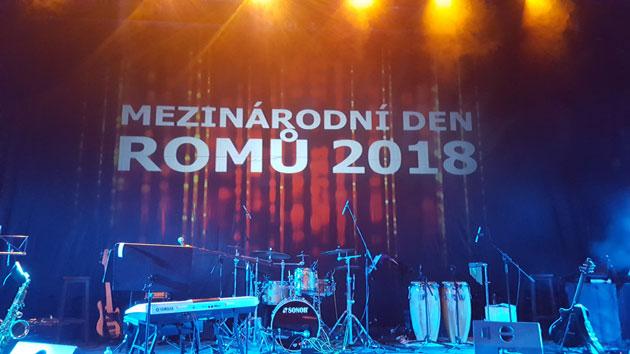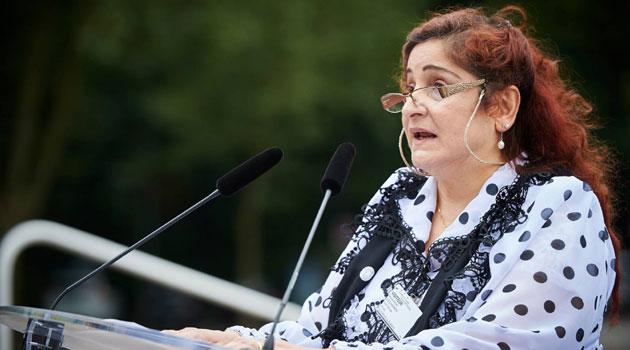Czech celebrations of International Romani Day head to Brussels with theater performance

Yesterday evening the Archa theater in Prague heard the stirring rhythms of Romani songs. 8 April, International Romani Day, fell on a Sunday this year.
Dozens of performers, non-Romani and Romani, celebrated the holiday and honored Gejza Horváth, the winner of the Milena Hübschmannová Award. ARA ART, the organizers of the Prague event, are heading to Brussels today as the only Romani theater company from all of Europe to perform an original production about Romani history at Roma Week this year.
The three-day Romani festival on the occasion of International Roma Day was held beginning on Friday throughout the Czech Republic including the capital, where Sunday’s gala concert at the Archa was the high point. The stage was shared over the course of two hours with the accompaniment of the Milan Kroka Live Band by famous Romani musical celebrities such as Antonín Gondolán, Matuš Bagár, Marta Balážová, Gitana from Slovakia, Romano Zorba–Horváth and naturally the phenomenal Gejza Horváth, who celebrated his 70th birthday this week.
Organizers congratulated Gejza Horváth on his birthday on behalf of all the performers directly on the stage as he was given an important award for his lifelong contribution to the language of Romanes, in which he writes his song lyrics. “I am proud to be a Rom. I am proud that I was born Romani and I don’t want this to sound sad, but I want to die Romani as well,” he said, and movingly commented on his personal relationship to his Romani identity: “The language of Romanes is based on tears, joy, passion, injustice and suffering. Romani people and our culture are behind the language of Romanes.”
VIDEO
Romipen, or Romani-ness
The term “Romipen” is used to refer to the set of cultural traditions, values, and ways of behaving, negotiating and performing those traditions not just within the Romani community and family, but also in public. These are unwritten laws handed down from one generation to the next through which (among other matters) Romani society differentiates itself from the majority society.
The director of ARA ART commented on this theme as follows: “As part of this year’s celebrations we asked what Romipen or Romani-ness basically means today for Romani people themselves – what forms it takes, how is it developing, whether it is cultivating us or holding us back. I personally perceive Romipen to be the positive values of the Romani nation.”
“I am glad we were able to organize the celebrations this year again,” the director said. “They make it possible for non-Romani people and Romani people to meet each other, to have a good time together and to mutually enrich each other, because each of us has something to contribute.”
The performers also expressed their views of the content and meaning of the Romipen concept. “The basis of Romipen is tolerance,” said Gejza Horváth.
He was not the only person to describe Romipen in those terms. According to other speakers, while Romipen transforms itself over time, graciousness and humility remain the basis of it.
“This evening is important for me, because now I know Romani identity is not dying out,” former presidential candidate Michal Horáček, who was one of the non-Romani guests of the evening, told the audience. The moderators began the gala concert by speaking about the importance of preserving Romani traditions and passing them down to the younger generation.
“We don’t have to know how to read musical scores, this is something we know how to do from our hearts, we just hand it down from one generation to the next,” said moderator Ladislav Goral, adding that this approach does not just relate to music, but to Romani culture generally. ART ART will now continue to celebrate International Romani Day by traveling to Brussels to present their production “….a zase jsme spali pindral” (“… and once again we slept pindral“).
This original theatrical production about Romani history is accompanied by live music and uses New Circus elements. The production is based on excerpts from texts by Gejza Demeter, Zora Horváthová, Ilona Ferková, Emil Cina and other Romani authors.
